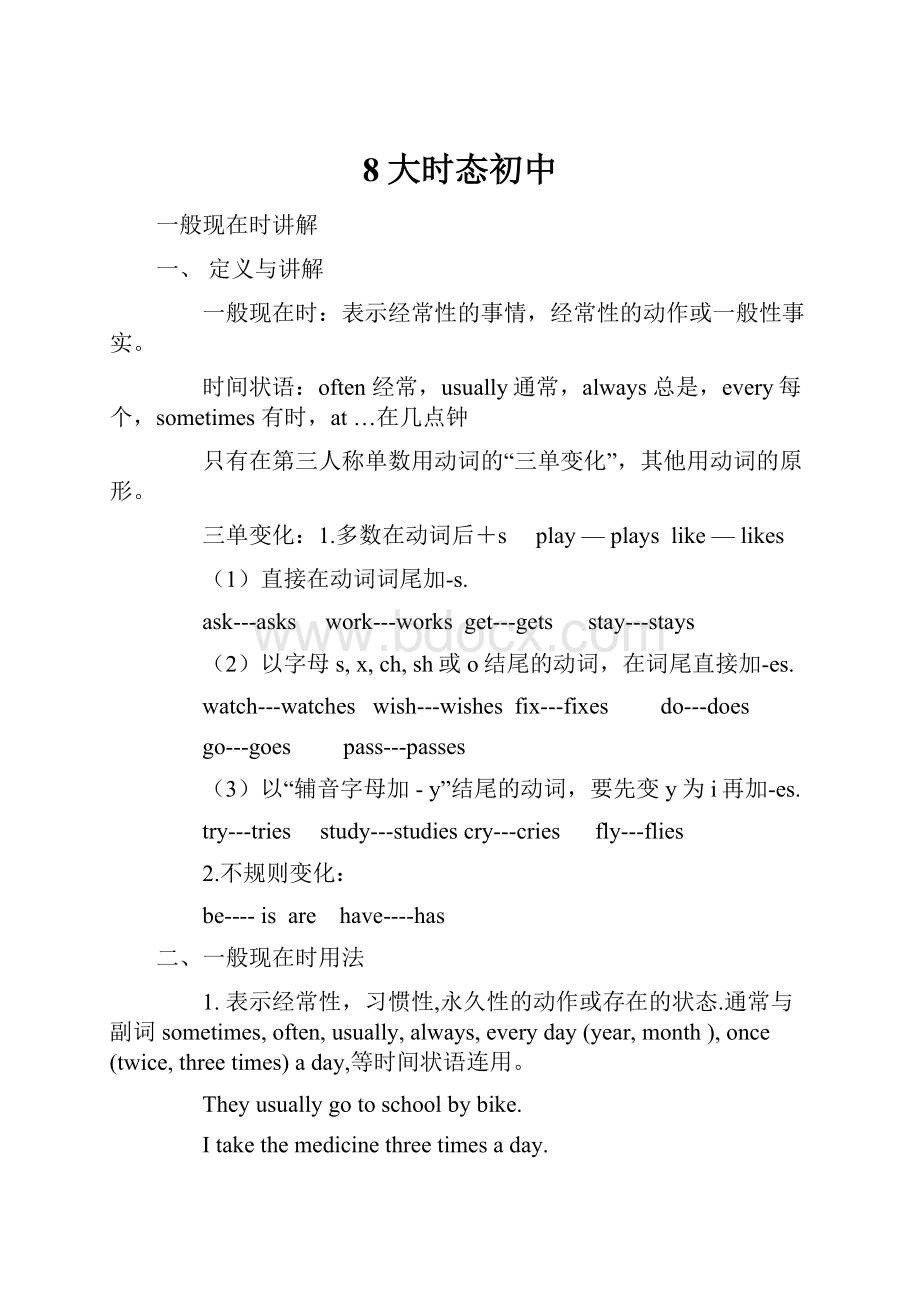8大时态初中文档格式.docx
《8大时态初中文档格式.docx》由会员分享,可在线阅读,更多相关《8大时态初中文档格式.docx(82页珍藏版)》请在冰豆网上搜索。

(3)以“辅音字母加-y”结尾的动词,要先变y为i再加-es.
try---tries
study---studiescry---cries
fly---flies
2.不规则变化:
be----is
are
have----has
二、一般现在时用法
1.表示经常性,习惯性,永久性的动作或存在的状态.通常与副词sometimes,often,usually,always,everyday(year,month),once(twice,threetimes)aday,等时间状语连用。
Theyusuallygotoschoolbybike.
Itakethemedicinethreetimesaday.
Shehelpshermotheronceaweek.
Mary’sfatherisapoliceman.
Thereare50studentsinmyclass.
2.表示客观真理,科学原理,自然现象,等客观事实或格言,谚语等。
Thesunrisesintheeastandsetsinthewesteveryday.
ThemanwhohasneverbeentotheGreatWallisnotarealman.
TomorrowisTuesday.
(一).用动词的适当形式填空
1.She_________(go)toschoolatseveno’clock.
2.It’s6
o’clock.Theyare_________(eat)supper.
3.Heusually___________upat17:
00.(get)
4.She___________(live)inBeijing.
5.Amy_________(be)herejustnow.
6._______(be)thereafly
onthetablejustnow?
7.Myfather__________(watch)TVeveryevening.
8.Myfather_______________(make)toysthesedays.
9.?
________Amy_________(read)Englisheveryday
10.ChenJiesometimes_________(go)totheparkwithhersister
(三)、用括号内动词的适当形式填空。
1.Heoften_________(have)dinnerathome.
2.DanielandTommy_________(be)inClassOne.
3.We_________(notwatch)TVonMonday.
4.Nick_________(notgo)tothezooonSunday.
5.they_________(like)theWorldCup?
6.Whattheyoften_________(do)onSaturdays?
7.yourparents_________(read)newspaperseveryday?
8.Thegirl_________(teach)usEnglishonSundays.
9.SheandI_________(take)awalktogethereveryevening.
10.There_________(be)somewaterinthebottle.
11.Mike_________(like)cooking.
12.They_________(have)thesamehobby.
13.Myaunt_________(look)afterherbabycarefully.
14.Youalways_________(do)yourhomeworkwell.
15.I_________(be)ill.I’mstayinginbed.
16.She_________(go)toschoolfromMondaytoFriday.
17.LiuTao_________(do)notlikePE.
18.Thechildoften_________(watch)TVintheevening.
19.WangKaiandWangli_________(have)eightlessonsthisterm.
20.-Whatday_________(be)ittoday?
-It’sSaturday.
1.
Weoften___________(play)intheplaygound.
2.
He_________(get)upatsixo’clock.
3.__________you_________(brush)yourteetheverymorning.
4.What__________(do)heusually
(do)afterschool?
5.Danny__________(study)English,Chinese,Maths,ScienceandArtanschool.
6.Mikesometimes__________(go)totheparkwithhissister.
7.Ateightatnight,she__________(watch)TVwithhisparents.
8.________Mike________(read)Englisheveryday?
9.Howmanylessons_________yourclassmate________(have)onMonday?
10.Whattime_________hismother_________(do)thehousework?
1.Doyouoftenplayfootballafterschool?
(肯定回答)
2.Ihavemanybooks.
(改为否定句)
3.GaoShan’ssisterlikesplayingtabletennis(改为否定句)
4.ShelivesinasmalltownnearNewYork.
(改为一般疑问句)
5.IwatchTVeveryday.(改为一般疑问句)
6.Davidhasgotagoal.(改为一般疑问句)
7.Wehavefourlessons.(否定句)
8.Nancydoesn’trunfast(肯定句)
9.Mydogrunsfast.否定句:
一般过去时态习题
1.一般过去时的定义
一般过去时表示过去某一时候或某一段时间所发生了的事情或存在的状态。
常与过去时间yesterday,thismorning,justnow,amomentago,inMay,lastnight/year/week,onceuponatime,theotherday,before…,when–clause,inthepast连用。
如:
Whatdidyoudoyesterday?
昨天你干了什么?
ImetLinTaothismorning.今天上午我会到了林涛。
Iwasthereamomentago.刚才我在那儿。
2.一般过去时的应用
(1)表示过去某时所发生的动作或存在的状态。
LiuYingwasinAmericalastyear.刘英去年在美国。
Jimrangyoujustnow.吉姆刚才给你打了电话。
(2)表示过去经常或反复发生的动作。
常接时间副词often,usually,always,sometimes,everyday/week,etc.如:
Weoftenwentoutforawalkaftersupper.我们过去常在晚饭后散步。
Weusuallyplayedtogether.我们通常一起玩。
(from)
3.一般过去时对谓语动词的要求
一般过去时的谓语动词要用动词的过去式。
动词过去式的构成分规则变化和不规则变化两种形式,不规则变化通常需要逐个记忆,规则变化则遵循以下原则:
(1)一般在动词后加-ed。
play—played,offer—offered,weigh—weighed,destroy—destroyed,sign—signed.
(2)在以字母e结尾的动词后,只加-d。
like—liked,provide—provided,hate—hated,date—dated。
(3)在以“辅音字母+y”结尾的动词后,则改y为i,再加—ed。
supply—supplied,fly—flied,study—studied.(from)
(4)在以单短元音的重读闭音节结尾且,末尾只有一个辅音字母的动词后,双写最后一个辅音字母,再加-ed。
plan—planned,refer—referred,regret—regretted,ban—banned.
4.特别说明
有些动词的过去时,如:
expect,hope,intend,plan,wanted等一般过去时,后接不定式的完成时;
或它们的过去完成时接不定式的一般式,都可表示过去未曾实现的意图、打算或希望。
Ihopedtohavebeeninvitedtohisweddingparty.—Ihadhopedtobeinvitedtohisweddingceremony.我本希望他来邀请我参加他的婚礼。
Iintendedtohavejoinedtheirgames.—Ihadintendedtojointheirgames.我本打算参加他们的比赛。
一、写出下列动词的第三人称单数形式、现在分词和过去式。
1.live_____________________2.walk_____________________
3.pick______________________4.lose________________________
5.look_______________________6.notice__________________________
7.ask________________________8.hurry_______________________
9.knock_______________________10.answer________________________
11.push______________________12.open______________________
13.listen_____________________14.enter_______________________
15.count_____________________16.finish___________________________
17.say______________________18.stop_________________________
19.call_____________________20.go________________________
二.根据句意用所给词的适当形式填空
1、--________(be)yourfatherinShanghaiyesterdaymorning?
--Yes,hewas.
2.I_________(be)bornin1990.
3.--__________(be)theybusylastweek?
--No,theyweren’t.
4.Mygrandfather________(listen)tomusicyesterdaymorning.
5.They__________(live)inthisscholayearago,butnowtheyleft.
6.MrSmithstoppedreadingEnglishpapersand___________(listen)tothemusic.
7.He___________(learn)about200newwordswhenhewasinthatschool.
8.Thebabylookedatmeand____________(cry)harderandharder.
9.Peter____________(notplay)footballyesterdayhe________(play)thepiano.
10.Lucy____________(arrive)inNewYorkthedaybeforeyesterday.
11.--Didyourmother__________(stop)workearly?
--No,shedidn’t.She___________(stop)workquitelate.
12.--_______you________(have)ameetingafterschool?
--No,wedidn’t.We_________(help)MrsBlackwiththehousework.
13._________you_________(finish)yourhomeworklastnight?
14.We____________(notnotice)theboyatfirst.
15.Where__________you___________(live)lastyear、
16._____you____________(remember)tobuytheoranges?
17.Who__________(invent)thecomputer.
18.We______(go)tothecinemalastnight.Thefilm______(be)verygood.
19.Whattime_____you______(get)toschoolthismorning?
20.Jim____(do)alotyesterday.He______(go)shoppingand________(cook)supper.
三、句型转换
1.HestudiedaboutonehundredEnglishwords.(改为否定句)
He________________aboutonehundredEnglishwords.
2.Welivedinthatbeautifulvillagetwoyearsago.(改为一般疑问句)
____________________________inthatbeautifulvillagetwoyearsago?
3.Damingdidhishomeworkyesterdayevening.(改为一般疑问句并作肯定回答)
_________Daming_________hishomeworkyesterdayevening?
________,he__________.
4.Goldilocksenteredthehouse.(改为一般疑问句,并作否定回答)
________Goldilocks________thehouse?
_______,she_________.
5.TheydecidetovisitBeijing.(改为一般过去时)
They_______________________Beijing.
6.Shepickedupthebowlbecauseshewantedtoeattherice.(对划线部分提问)
_________________she_________uphebowl?
7.Theystoppedworkingonehourago.(改为否定句)
They______________workingonehourago.
8.Westayedatthathoteltwoyearsago.(对划线部分提问)
________________you_________atthathotel?
9.Theyarrivedherebytaxi.(对划线部分提问)
_________________they________here?
10.Wewereathomelastnight.(对划线部分提问)
_______________youlastnight
四、把下列句子改成相应时态
1.Heusuallygetsupearlyinthemorning.
But________latetoday.
2.Sheusuallyworksfrom8a.m.to5p.m.
Butyesterday__________________________.
3._____________________onSundays.
TheywenttotheparklastMonday.
4._____________________atbreakfast.
Butyesterdayhedidn’treadthenewspaper.
五、改写句子:
1、Lucydidherhomeworkathome.(改否定句)
Lucy______________herhomeworkathome.
2、Hefoundsomemeatinthefridge.(变一般疑问句)
______he___________meatinthefridge?
3、Shestayedthereforaweek.(对划线部分提问)
_________________she_____there?
4、Therewassomeorangeinthecup.(变一般疑问句)
_____there_____orangeinthecup?
一般将来时/式(TheSimpleFuturetense)
时态定义:
一般将来时表示将来某一时刻的动作或状态,或将来某一段时间内经常的动作或状态。
常常和表示将来的时间状语连用。
shall和will常常缩写成'
ll,紧接在主语之后。
其否定式shallnot和willnot的缩写式分别为shan'
t和won'
t。
基本句型
begoingto表示客观安排或受人指示而做某事。
后+动词原形。
beaboutto+动词原形,意为马上作某事,不能与tomorrow,nextweek等表示明确将来时的时间状语连用。
①肯定句:
主语+begoingtodo/主语+will+动词原形
②否定句:
主语+benotgoingtodo/主语+willnot+动词原形
③疑问句:
Be动词+主语+goingtodo/Will+主语+动词原形
简略回答:
(肯)Yes,主语shall/will(否)No,主语shall/willnot
④特殊疑问句:
一般将来时的特殊疑问句是将疑问词放在句首,后接一般疑问句(就主语提问时,以疑问词who开头的疑问词除外)
-----WhywillyoubehereonSunday?
(周日你为什么将要在这儿?
)
-----IwillhaveameetingonSunday(我将要在周日举行一个聚会)
(对特殊疑问句要进行具体回答)
一般疑问句:
be或will提到句首,some改any,and改or,第一二人称互换
Wearegoingtogoonanoutingthisweekend.-------Areyougoingtogoonanoutingthisweekend?
被动句:
will/shall+be+v.ed(及物动词过去分词)
Theletterwillbesentt